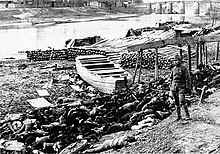
Japanese war crimes
War crimes and crimes against humanity committed by the Empire of Japan / From Wikipedia, the free encyclopedia
Dear Wikiwand AI, let's keep it short by simply answering these key questions:
Can you list the top facts and stats about Japanese war crimes?
Summarize this article for a 10 year old
During its imperial era, the Empire of Japan committed numerous war crimes and crimes against humanity across various Asian-Pacific nations, notably during the Second Sino-Japanese and Pacific Wars. These incidents have been contentiously referred to as "the Asian Holocaust",[6][7] and "Japan's Holocaust",[8] and also as the "Rape of Asia".[9] The crimes occurred during the early part of the Shōwa era, under Hirohito's reign.
| Japanese war crimes | |
|---|---|
| Part of the territorial conquests of the Empire of Japan | |
 | |
| Location | In and around East Asia, Southeast Asia, and the Pacific |
| Date | 1927–1945[1] |
Attack type | war crimes, mass murder, ethnic cleansing and other crimes against humanity |
| Deaths | 19 million[2][3][4] - c. 30,000,000[5] |
| Perpetrator | Empire of Japan, Imperial Japanese Army |
| Motive | |
| Trials | Tokyo Trial, and others |
The Imperial Japanese Army (IJA) and the Imperial Japanese Navy (IJN) were responsible for a multitude of war crimes leading to millions of deaths. War crimes ranged from sexual slavery and massacres to human experimentation, starvation, and forced labor, all either directly committed or condoned by the Japanese military and government.[10][11][12][13][14] Evidence of these crimes, including oral testimonies and written records such as diaries and war journals, has been provided by Japanese veterans.[15]
The Japanese political and military leadership knew of its military's crimes, yet continued to allow it and even support it, with the majority of Japanese troops stationed in Asia either taking part in or supporting the killings.[16]
The Imperial Japanese Army Air Service participated in chemical and biological attacks on civilians during the Second Sino-Japanese War and World War II, violating international agreements that Japan had previously signed, including the Hague Conventions, which prohibited the use of "poison or poisoned weapons" in warfare.[17][18]
Since the 1950s, numerous apologies for the war crimes have been issued by senior Japanese government officials; however, apologies issued by Japanese officials have been criticized as insincere. Japan's Ministry of Foreign Affairs has acknowledged the country's role in causing "tremendous damage and suffering" before and during World War II, particularly the massacre and rape of civilians in Nanjing by the IJA.[19] However, the issue remains controversial, with some members of the Japanese government, including former prime ministers Junichiro Koizumi and Shinzō Abe, having paid respects at the Yasukuni Shrine, which honors all Japanese war dead, including convicted Class A war criminals. Furthermore, some Japanese history textbooks provide only brief references to the war crimes,[20] and certain members of the Liberal Democratic Party have denied some of the atrocities, such as the government's involvement in abducting women to serve as "comfort women", a euphemism for sex slaves.[21][22]